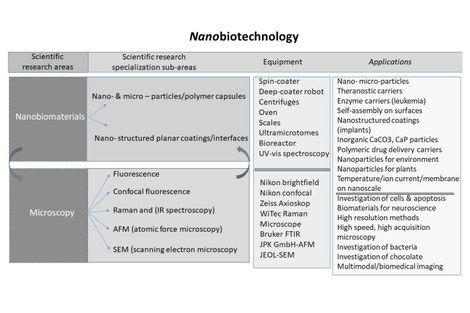NanoBioTechnology
The NanoBioTechnology (NBT) research group carries out an ambitious research program covering two inter-related research areas: nano-bio-technology and microscopy.
We are developing novel nano-bio-materials (for example, polymeric capsules/particles and polymer/hydrogel coatings) for drug delivery applications and implants. These bio-materials are characterized by: fluorescence microscopy, Raman and IR microscopy, AFM (atomic force microscopy), electron microscopy, which we are using and for which we are developing specialized approaches.
Nano-Bio-materials
Particulate (nano- and micro- meter) drug delivery carriers
Polymeric capsules are made by a sequential deposition of polymers on the surface of particles, which serve as templates and which are subsequently removed (by dissolution) without affecting the polymeric shell. Different application areas of microcapsules are currently pursued, particularly noticeable are those in biomedicine. The group of prof. Skirtach pursues development of next generation of drug delivery carriers and other applications in biomedicine and bio-engineering. This research stems from previous work at MPI-KG, Germany.
Coatings for cell growth and tissue engineering.
An essential novelty, which is unique to our group, is to combine research on films with that on particles for creating novel surfaces and:
- assuring drug delivery
- controlling the release
- enhancing and controlling mechanical properties for facilitating cell and tissue growth.
Two types of coatings are investigated: those based on polymers and those based on hydrogels. Cell adhesion studies are aimed at the end goal - designing versatile coatings for tissue engineering.
Microscopy
The Faculty of Bioscience Engineering and the University of Ghent possesses a state of the art imaging center. Two recent developments at the Faculty have important implications for this area. First, the establishment of the Light Microscopy Division (LiMiD), coordinated by the Department of Molecular Biotechnology. And second, the extension of the LiMiD center into a full-scale microscopy center with availability of the following microscopy techniques: bright-field fluorescence microscopy, confocal fluorescence microscopy, Raman microscopy and FTIR spectroscopy, AFM (atomic force microscopy) and SEM (scanning electron microscopy).
The aim was to establish, maintain, and further develop a "one-stop" imaging center, i.e. the center where characterization of all samples, but using different and complementary methods, can be done at the same location.
Expertise
The main research areas, the specialization research sub-areas, equipment, and targeted applications can be seen in the following table.
Publications
- Last 5 publications :
- All publications
Contact information
Please contact professor Andre Skirtach for more information.
